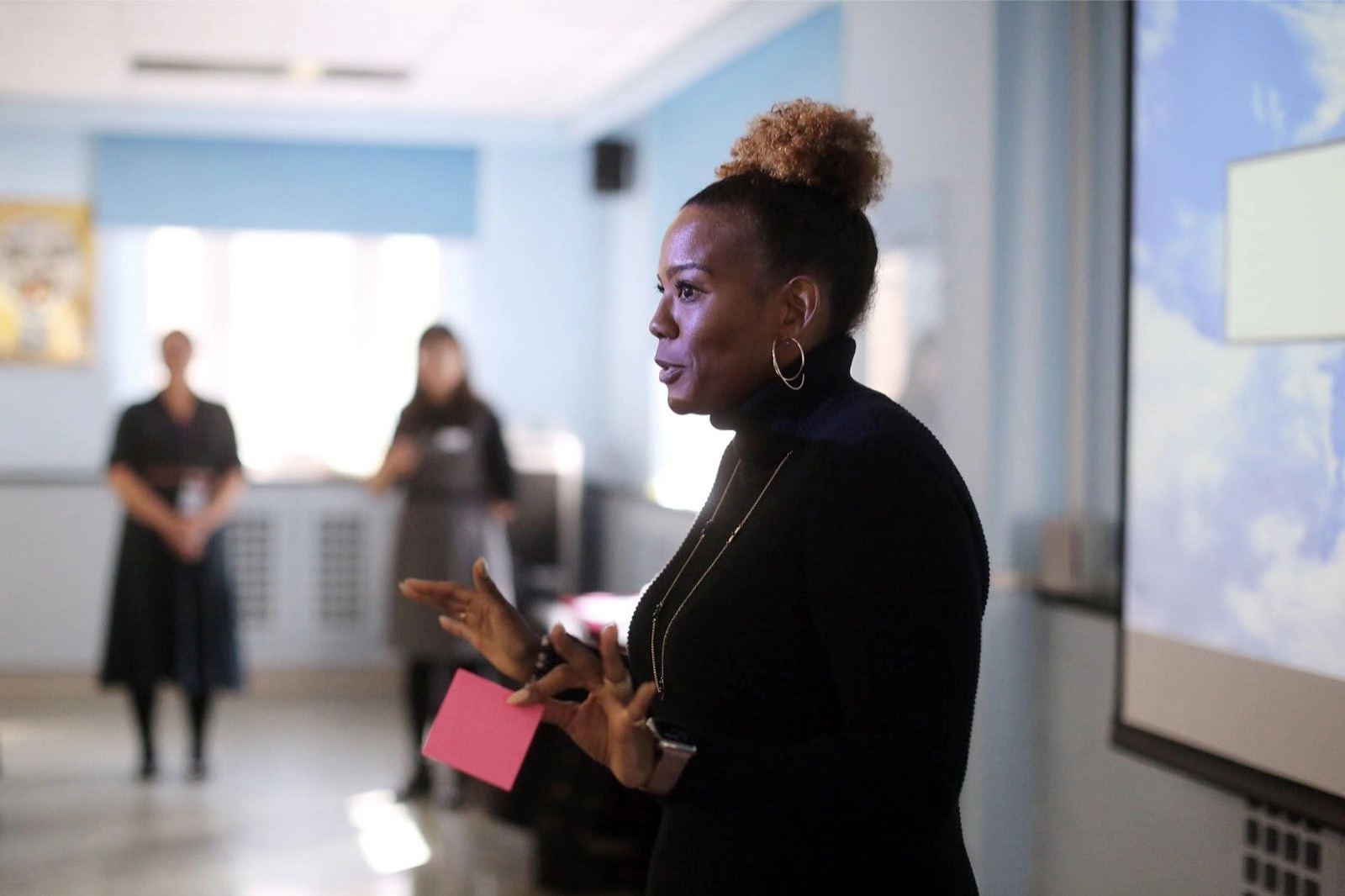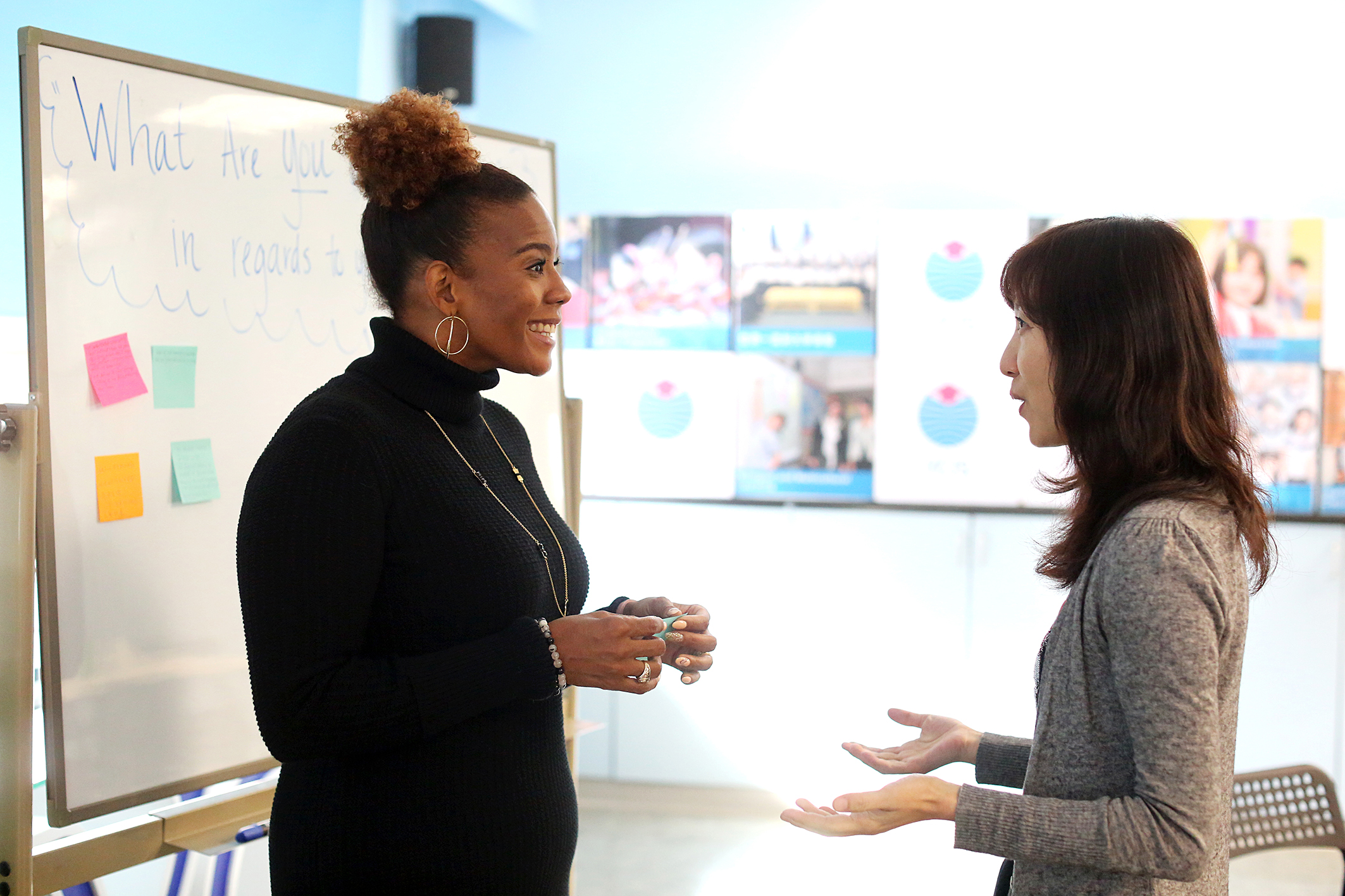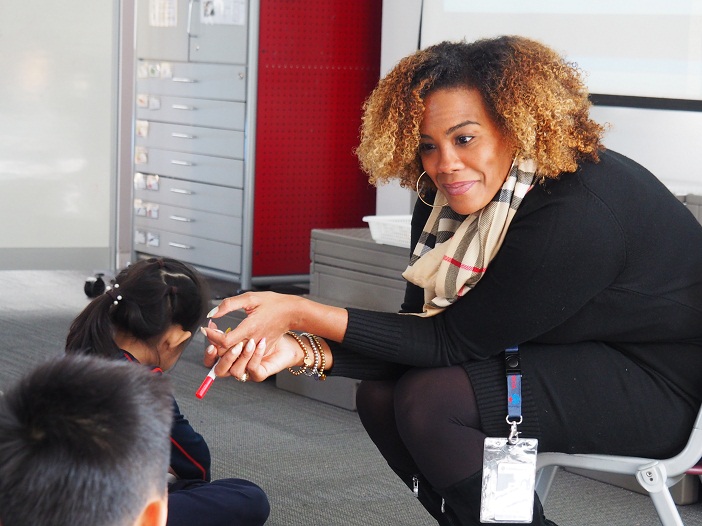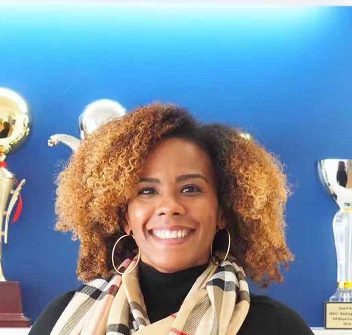From a plaque on her wall in her tastefully decorated office on the Yew Chung International School of Beijing (YCIS Beijjing) campus, Ms. Rachel George reads to me the key reason why she is here doing what she does. “‘We believe that each child is unique with innate talents and with gifts which should be nurtured to their fullest potential.’ As soon as I saw that this was a part of the school guiding ethos, I knew that this was where I needed to be. And I have never looked back.”

Ms. George with some of her students
George, a Texas native, has been in China for the last two years and as she puts it, her spirit is at absolute peace in this massive city, in no small part due to how she found her current position and eventually moved here. Hearing her story, it is easy to say that someone or something beyond her had a plan for her to be in Beijing. “It’s small things, like for instance, my best friend adopted a child from China of whom I am the godmother. I also had a weird problem with my car where it would display commands in Chinese. Just small things that were linked to China in one way or another made me realize that this was the place I was meant to be.”
“Everyone is so free here”, she muses at the general atmosphere she has come to enjoy in China. “Walking down the street, you hear people singing. They all have a sense of joie de vivre. Old people are active, they are out walking, and playing with their birds and no one has time to be ‘old’ here.”
Her overwhelmingly positive experiences living here in Beijing are a long way from her upbringing in South West Louisiana, where she was born and raised before eventually relocating to Texas. “I remember getting on the bus and the girls at the back of the bus wearing KKK hoods. I believe I was in fifth grade at the time.” It is harsh realities like these that went into the makings of what would be an international counselor to children from all walks of life at YCIS Beijing.
 Ms Rachel George
Ms Rachel George
George is not new to the world of teaching, having over 16 years of experience teaching and working as a guidance counselor back in the States, working with children from disadvantaged backgrounds, whose parents had passed away or were missing in their lives for one reason or the other. However, this is markedly different from the students who she works with at present, who one might say are from more affluent or well-to-do families.
It is undeniable that the pressures to succeed have been amped up particularly for the current generation of parents and children. Academic excellence, especially in Mainland China, is of particular importance to families who work hard to afford their children the best education and extracurricular activities that money can buy. Unfortunately this sometimes comes at the cost of social, psychological and emotional development. ‘We push these kids towards success and perhaps they go to very good colleges, maybe even in the States. But do they have the social skills to navigate the world? Can they be on their own?’
As an American stepping in to a mostly Chinese setting, George also had to come to grips with the emotional dynamics of Chinese, and the larger East Asian, society. Silence and stoicism are virtues, and a legacy of this part of the world, something that children also pick up from their parents, meaning they are either unable or unwilling to verbalize personal problems as and when they arise. “Most kids don’t want to disappoint, so the idea of sharing their concerns with their parents is unthinkable.” George strives to find techniques with which to have these sensitive conversations with parents, while making the link between academic success and emotional health. “Younger parents are more progressive. They will take research I present to them and read it at home.”
This is not to say that the opposite is true of Western students and their parents. As George points out, there is no such thing as a collective Western way of thinking. All of her students from different countries are different, and she has had to learn to speak their language and understand them with their cultural backgrounds in mind.

George notes that well-meaning parents might tend to not only push their children towards academic excellence but also often shelter them from any real struggle. Their opportunities to learn from their mistakes are taken away. “I encourage parents to let their kids struggle, because it builds character.” It might be as a result of their own struggles while growing up, but the innate response it would seem, for most parents, is to clear as smooth a path for their children as they possibly can. But this, rather than giving their children an edge, detracts from their development and self-actualization. George advises parents to foster a sense of “I can do it myself” in their children. “The children are much protected and I appreciate this. There is a lot of love in that sort of protection and it always comes from a good place. But you have to let your child struggle.”
It is undoubtedly important for anyone in her position to appreciate and understand that each child is the very best that their parents have to offer and are eager to work to ensure that their children are the very best version of themselves that they can be.
Recalling her own childhood, she notes one marked difference in the student-teacher dynamic, with teachers occupying the role of authority figures, not striving to form connections with their students. But George notes the importance of fostering trust between students and teachers. Teachers must not only interact with their students, but try to know the individual. As she herself got into the teaching profession, she realized the importance of building trust with her students. Given that most the students that she worked with at the time were from disadvantaged backgrounds, it was imperative that a connection be fostered. These connections would be relied upon by the student, who required her to provide them with some much needed guidance in their lives, especially in the face of missing parents and authority figures in their lives. George strives to empower other teachers to have the skills needed to meet their students’ emotional needs, part of what she envisions in her Beijing future. “Five years from now, my ultimate desire would be to keep doing what I do: workshops, talking to educators on how to work emotional learning and to empower kids to be the best they can be; empowering teachers to be counselors; equipping teachers with the skills to teach hearts as well as minds.”

Ms. George in action
One would wonder how someone who spends so much of her day giving to others emotionally is able to remain grounded on a day-to-day basis. Admittedly, George’s job is a 24-hour one, with constant interactions with students and faculty at school during school hours, and liaising with parents even when not at work. But she has set herself a few “self-care” ground rules to survive the vicissitudes of being an emotional healer of sorts. As a personal rule, she doesn’t check her emails after 5pm. She has also had to set some boundaries between her and those she works to help by making clear what she can and cannot assist with. She is an admitted overachiever and as a consequence, tends to push herself a lot more than she should. Coming from a setting where she was in charge of eight other counselors who could share the burden of work, at YCIS Beijing she works valiantly as a one-woman army. But that also means at the end of the day, she doesn’t have anyone with whom she can ethically share case details with, or debrief. This however doesn’t stop her from taking it in her stride as she doles out parenting advice and looks to the future.




